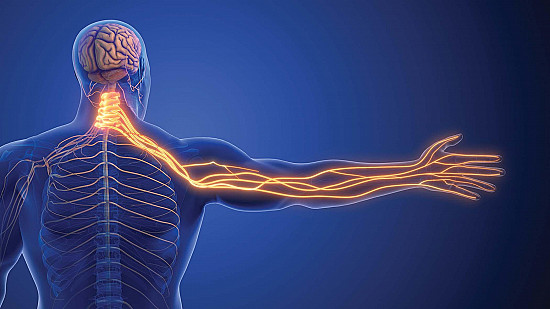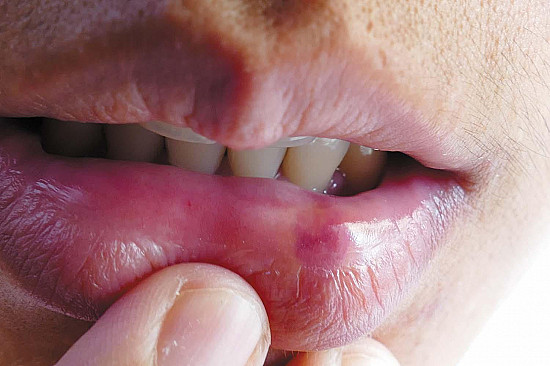Got a pinched nerve? Strategies and treatments for pain relief
- Reviewed by Robert H. Shmerling, MD, Senior Faculty Editor, Harvard Health Publishing; Editorial Advisory Board Member, Harvard Health Publishing

A pinched nerve can cause discomfort that ranges from mild to severe, making it hard to go about your daily life. Whether it’s sharp pain, tingling, or numbness, addressing the problem early can help you feel better faster.
What is a pinched nerve?
A pinched nerve refers to the compression of a nerve anywhere along its course. Pinched nerves occur when pressure is applied to a nerve by surrounding tissues, such as fluid, bones, muscles, or tendons. This pressure can disrupt the nerve’s function, causing pain, numbness, or weakness. Pinched nerves can occur anywhere in the body but are especially common in the neck, lower back, and wrists.
The term "pinched nerve" is not a formal medical diagnosis. Health care professionals typically identify more precise underlying conditions or effects related to nerve compression, such as radiculopathy or spinal stenosis. In some cases, they may refer to a pinched nerve as "nerve entrapment."
Symptoms of a pinched nerve
The symptoms of a pinched nerve can vary in duration, ranging from temporary to chronic, depending on the severity and underlying cause. Common symptoms include:
- sharp, aching, or burning pain that may radiate outward
- tingling or a “pins and needles” sensation
- numbness or reduced sensation in the affected area
- muscle weakness
- a feeling that the limb has "fallen asleep.”
If symptoms persist or worsen, seek medical evaluation to avoid possible long-term nerve damage.
Common sites of pinched nerves
Pinched nerves can occur anywhere nerves are found in the body. In the spine, the two most common locations are in the neck and the lower back. Compression of the nerves in the neck (cervical spine) can cause pain and tingling down the arms, while a pinched nerve in the lower back (lumbar spine) often leads to sciatic nerve pain, radiating down one leg.
Other examples of pinched nerves in the body include:
- Wrist: Compression of the median nerve, which extends through the arm and hand, can lead to carpal tunnel syndrome, causing tingling, numbness, and weakness in the hand.
- Elbow: The ulnar nerve, which extends from the shoulder, through the arm and into the hand, may become compressed, resulting in cubital tunnel syndrome, which often causes tingling or pain in the ring and pinky fingers.
- Thigh: Pressure on the lateral femoral cutaneous nerve, located in the thigh, can cause meralgia paresthetica, leading to burning or numbness on the outer thigh.
- Heel or sole of the foot: Compression of the tibial nerve in the ankle can lead to tarsal tunnel syndrome, causing pain, tingling, or numbness in the foot.
What causes a pinched nerve?
A pinched nerve occurs when something compresses or irritates the nerve. Nerves that pass through narrow anatomic spaces are more likely to become compressed. Any factors that lead to compression and narrowing of nerve passageways can lead to a pinched nerve. This can occur for several reasons, including:
- Osteoarthritis: With age, the joints and discs in the spine can begin to wear down, leading to osteoarthritis. This common type of arthritis can cause the small joints in the spine, known as facet joints, to enlarge. Over time, this enlargement may narrow the space for nerves exiting the spinal canal.
- Herniated discs: Intervertebral discs serve as cushions between the vertebrae. Over time they can become dry and develop cracks, which may allow the inner material to leak out and put pressure on nearby nerves.
- Spondylolisthesis: This condition occurs when one or more vertebrae in the spine shift out of place, which can lead to a narrowing of the space where nerves travel to and from the spinal cord.
- Congenital conditions: Some people are born with a narrowed spinal canal or carpal tunnel, and they are prone to symptoms of a pinched nerve.
Swelling or inflammation of the surrounding tissue can also place pressure on nerves, leading to symptoms. This can happen for many reasons, including:
- Injury: Trauma from accidents, falls, or repetitive strain can damage the muscles, ligaments, or other tissues near a nerve, causing them to swell and press on the nerve.
- Infectious diseases: Certain infections, such as a bacterial abscess, can compress one or more nerves.
- Obesity: Carrying excess body weight can increase the pressure on nerves, especially in areas like the spine, lower back, or legs. Over time, this extra stress may lead to nerve compression and related symptoms.
- Rheumatoid arthritis or other causes of inflamed joints: The inflamed tissue and fluid surrounding the joints in these conditions can lead to compression of nearby nerves.
- Pregnancy: Carpal tunnel syndrome is common during pregnancy and tends to improve after delivery.
Home remedies for pain relief
For early or mild symptoms of a pinched nerve, conservative treatment at home is typically recommended. Although a pinched nerve can be very painful, symptoms often get better on their own over time.
The first step is to limit activities that worsen pain, especially during the first week. However, this doesn’t mean complete inactivity. Once symptoms improve, gradually resume light physical activity based on what feels comfortable. In addition to activity modification, you can also try:
- Ice and heat therapy: Ice can reduce swelling, while heat soothes tense muscles. Applying ice or a heating pad for 15 to 20 minutes at a time can help reduce inflammation and ease pain.
- Over-the-counter pain relief: Acetaminophen (Tylenol) or nonsteroidal anti-inflammatory drugs (NSAIDs) like ibuprofen (Advil) can help reduce inflammation and pain.
- Stretching: Gentle stretches can reduce muscle tension around the affected nerve. Try holding the stretch for 10 to 30 seconds and repeating each movement two to three times. If stretching causes more pain, stop immediately.
Home remedies should be tried for one to two weeks. After this period, if your symptoms are not better or if they worsen, see your doctor to discuss medical treatments. Your doctor may recommend physical therapy.
Physical therapy and exercises for a pinched nerve
Physical therapy may help if symptoms persist or don’t improve with initial at-home treatment. A physical therapist can design a program tailored to your condition. Therapy often includes:
- Strengthening exercises: Building muscles around the affected area can help relieve pressure.
- Stretching routines: Stretching both enhances flexibility and reduces tightness on the affected nerve.
- Manual therapy: Hands-on treatment including massage can reduce inflammation around the nerve root.
Exercises and therapy not only relieve pain but also reduce the risk of recurrence. If possible, begin therapy before your symptoms become severe. Once your symptoms are severe, it may be much harder to tolerate the exercises.
Medical treatment for a pinched nerve
If home remedies and physical therapy don’t provide relief, medical treatments may be necessary.
Medications
Medications can help manage the pain and other symptoms caused by a pinched nerve, particularly if symptoms are severe or persistent despite other treatments. All medications carry potential side effects, so talk to your doctor about risks and benefits of the treatment. Some commonly prescribed medications for a pinched nerve include:
- Muscle relaxants: These can be prescribed for muscle spasms caused by a pinched nerve. Side effects may include drowsiness, dizziness, or dry mouth.
- Oral or injected steroids: Short-term use of corticosteroids may reduce swelling and inflammation around the nerve. Side effects of long-term use can include weight gain, mood changes, high blood pressure, and increased blood sugar levels.
- Nerve pain medications: Drugs like gabapentin or pregabalin target nerve pain specifically. Potential side effects include drowsiness, dizziness, or swelling in the legs.
Surgery
Surgery is usually considered for a pinched nerve only when there is a clear-cut anatomic explanation for the symptoms and the symptoms are severe, long-lasting, or resistant to other treatments. The goal is to relieve pressure on the nerve, which can significantly reduce pain and improve function.
The type of surgery your doctor recommends will depend on the cause of the pinched nerve. For example, a surgery called a discectomy is sometimes used to remove part of a herniated disc in the spine if it’s pressing on a nerve.
As with any surgery, there are risks, including infection, bleeding, or complications from anesthesia. Discuss the potential benefits and risks with your doctor to determine the best approach for your situation.
When to see a doctor for a pinched nerve
While many cases of a pinched nerve improve with rest and home treatments, some situations require medical attention. If your symptoms are severe, worsening, not improving after a few weeks, or are interfering with daily life, see your doctor.
In addition, certain symptoms may indicate a more serious condition that requires immediate care:
- Severe or worsening pain: If the pain becomes unbearable or spreads to other areas of your body
- Numbness or weakness: Persistent or worsening numbness, tingling, or weakness in your limbs
- Loss of bladder or bowel control: This could indicate a serious condition, such as cauda equina syndrome.
- Fever: This may suggest infection, which is a rare and serious cause of nerve compression.
- Trauma: If you experienced significant physical trauma prior to the start of nerve symptoms, you may have a fracture, ligament injury, or other serious injury.
Preventing a pinched nerve
Taking steps to protect your spine and joints can help reduce the risk of developing a pinched nerve. Small lifestyle changes can make a big difference:
- Practice good posture: Sitting and standing with proper alignment helps minimize pressure on your spine and nerves.
- Stay active: Regular exercise strengthens muscles that support your spine and improves flexibility, reducing the risk of injury.
- Maintain a healthy weight: Excess weight can put extra strain on your spine and nerves, increasing the likelihood of compression.
- Use proper techniques for lifting: Bend your knees and keep heavy objects close to your body to avoid putting too much strain on your back.
- Take breaks from repetitive activities: Whether at work or home, avoid staying in one position or performing repetitive motions for long periods.
- Stretch regularly: Gentle stretches can help keep your muscles and joints flexible, reducing the risk of pinched nerves.
About the Author

Jennifer Fisher, MMSc, PA-C, Health Writer
About the Reviewer

Robert H. Shmerling, MD, Senior Faculty Editor, Harvard Health Publishing; Editorial Advisory Board Member, Harvard Health Publishing
Disclaimer:
As a service to our readers, Harvard Health Publishing provides access to our library of archived content. Please note the date of last review or update on all articles.
No content on this site, regardless of date, should ever be used as a substitute for direct medical advice from your doctor or other qualified clinician.















